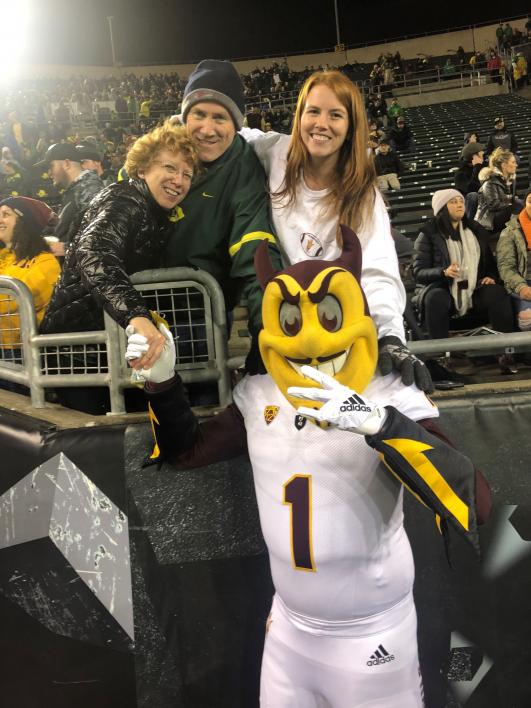Sparky is more than a mascot to 2019 Barrett graduate

Walker McCrae, who portrayed Sparky the Sun Devil at games and events for two years, is graduating with a bachelor's degree in business data analytics and sports business from the W. P. Carey School of Business and honors from Barrett, The Honors College at ASU.
Editor’s note: This is part of a series of profiles for spring 2019 commencement.
Walker McCrae, an Arizona State University student set to graduate in May with a bachelor’s degree in business data analytics and sports business from the W. P. Carey School of Business with honors from Barrett, The Honors College, had an alter ego during his undergraduate years.
Unbeknownst to everyone except his closest family and friends, McCrae was one of about half a dozen students who portrayed ASU’s beloved mascot Sparky at games and events.
When he donned the Sparky costume, McCrae transformed from a mild mannered academician into an ASU icon capable of whipping up crowd spirit at football and basketball games with his enthusiastic antics and push-ups to equal every point scored.
He joined the Sparky team at the end of his sophomore year. “The process behind joining was fairly straightforward,” McCrae said. “All we had to do was a pushup test. Then, the team put me in the suit at a baseball game and essentially threw me in the fire.”
McCrae grew up in Portland, Oregon, and as a child attended University of Oregon football games. As Sparky, he accompanied the Sun Devils to Eugene for a game against the Ducks.
He said being able to go back to the University of Oregon and watch the game from the field was very special, except for one thing: “I’ll never forget the booing we heard running onto the field,” McCrae said.
Another experience that stands out in his mind is when he was in the arena in Dayton, Ohio, for the Sun Devils' appearance in an NCAA Tournament game in 2018.
His resume lists the Sparky gig as “game enrichment specialist.” McCrae had to conceal his identity as well as the work he did to promote school spirit, because nobody is supposed to know who is inside the Sparky costume in order to keep the mascot mystique alive.
When he wasn’t being Sparky, McCrae pursued other opportunities in sports. During the 2019 spring training season, he interned for the Cincinnati Reds, assisting with special events at the Reds Development Complex and Goodyear Ballpark, giving tours, providing local transportation for Reds personnel and helping with administrative tasks and customer service.
In 2018, he was a training camp intern with the Los Angeles Rams football team in Irvine, California, and a marketing and brand consultant for the Fiesta Bowl, the Scottsdale-based organization that presents Arizona’s annual college football bowl game.
McCrae teamed up with three other Barrett, The Honors College students to make a film called “Being Sparky. Forks Up. Mask Off.” The documentary-style film was the group’s honors creative project. The film, a behind-the-scenes look at what it is like to be Sparky, premiered in early April, coinciding with McCrae’s last appearance as Sparky on April 6.
“Being Sparky helped me develop leadership skills, get exposed to the business of sports and interact with fans. It was a great experience,” he said.
McCrae as Sparky with his parents and his sister.
Question: What was your “aha” moment, when you realized you wanted to study the field you majored in?
Answer: I was fortunate enough to have my “aha” moment fairly early. I knew I wanted to go into sports, but I wasn’t quite sure what specifically I wanted to do. It was my freshman year of high school and my family and I went to see a movie. My parents went to see "Moneyball," while my sister and I saw "Paranormal Activity 3." Our movie got out earlier so we decided to join my parents. It was the scene where Billy Beane (Brad Pitt) is meeting with John Henry to discuss becoming the general manager of the Boston Red Sox. They’re sitting in the press box having a candid conversation about the sport and where it is heading. That scene has resonated with me so much and I knew in the moment that’s exactly what I wanted to do.
Q: What’s something you learned while at ASU — in the classroom or otherwise — that surprised you, that changed your perspective?
A: Something I learned at ASU that surprised me was just how many opportunities there were to either get involved on campus or gain experience through a job. I was initially intimidated by the size of the student population here and worried I would get lost in the mix. My favorite thing about ASU is that there is a niche for everyone and you can truly be whoever you want to be. There are so many clubs to join and no matter what you’re interested in there are other people just like you.
Q: Why did you choose ASU?
A: I chose ASU for its sports business program and because of its location relative to other sports entities. Growing up, I had always wanted to attend the University of Oregon but after touring there, I realized its remote location would make it difficult to find experience in the sports world. ASU had those resources. In the greater Phoenix area, there is a team in the NBA, NFL, MLB, NHL, WNBA, USL (minor league soccer), as well as spring training, the Waste Management Phoenix Open, countless sports companies, and an athletic department serving the largest school in the country.
Q: Which professor taught you the most important lesson while at ASU?
A: I have two professors that stood out during my time at ASU. The first isn’t “technically” a professor but he taught my introduction to business class freshman year. His name is Tim Desch and he helps oversee admissions for W. P. Carey. He taught me that it’s OK to be yourself and to embrace that. He encouraged me to get involved with anything that interested me and never expressed doubt or concern about the career path I had chosen. Any time I had questions, I knew I could drop into his office on a whim and receive whatever advice I needed. The second professor was my Human Event professor, Dr. Mary Ingram-Waters. She taught me the value of quality writing and how to express my points in the best way possible. Additionally, she was the first person to suggest a documentary about being Sparky and never wavered from covering that aspect of my life. I first heard of her from my brother-in-law who had Dr. Ingram-Waters as his Human Event professor and from that suggestion, I found a lifelong mentor.
Q: What’s the best piece of advice you’d give to those still in school?
A: The piece of advice I would give to those still in school is to soak up every moment you can and in the words of Joel Embiid, a Philadelphia 76ers basketball player, “Trust the process.” College is a grind, and there can be moments where it seems the work is never-ending. It’s important to reflect how far you have come and the accomplishments you have made. Additionally, don’t let class get in the way of a great opportunity. Yes, school is extremely important, but if there was one thing I could do differently, it would be not saying no to jobs just because of class. School always works itself out and if you have a great opportunity at your fingertips, take it and figure it out as you go along.
Q: What was your favorite spot on campus, whether for studying, meeting friends or just thinking about life?
A: My favorite spot on campus was the Sparky locker room in Sun Devil Stadium. There I had the opportunity to bond with my teammates and experience the highest and lowest of moments. There was constant laughter and goofing around but also a sense of responsibility and a shared goal of accomplishing whatever task we had ahead of us. Celebrating after the upset win against Washington last season was something I’ll carry with me for the rest of my life.
Q: What are your plans after graduation?
A: After graduation, I will be working with the Phoenix Mercury in their marketing department.
Q: If someone gave you $40 million to solve one problem on our planet, what would you tackle?
A: If I had $40 million to solve one problem, I would put it toward funding youth sports around the world. Sport has an incredible power to bring people together and keep kids out of dangerous environments. Allowing children to participate in a sport from a young age teaches them the value of teamwork, communication, work ethic and leadership. All of which they can use to become successful later in life.
More Business and entrepreneurship

With help from ASU and a viral TikTok, an entrepreneur soars
Nearly five years ago, Ruben Trujillo saw his entrepreneurial dream slipping away as he wondered how he would pay his rent.Now,…

Honoring 2 decades of entrepreneurial impact on a global scale
Thunderbird for Good, the impact-driven initiative of Thunderbird School of Global Management at Arizona State University, is…

ASU and GoDaddy launch Student Athlete Venture Studio
In a groundbreaking initiative aimed at empowering college athletes beyond their playing careers, Arizona State University and…


